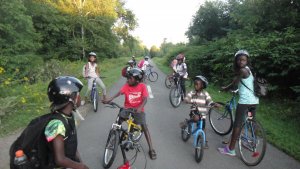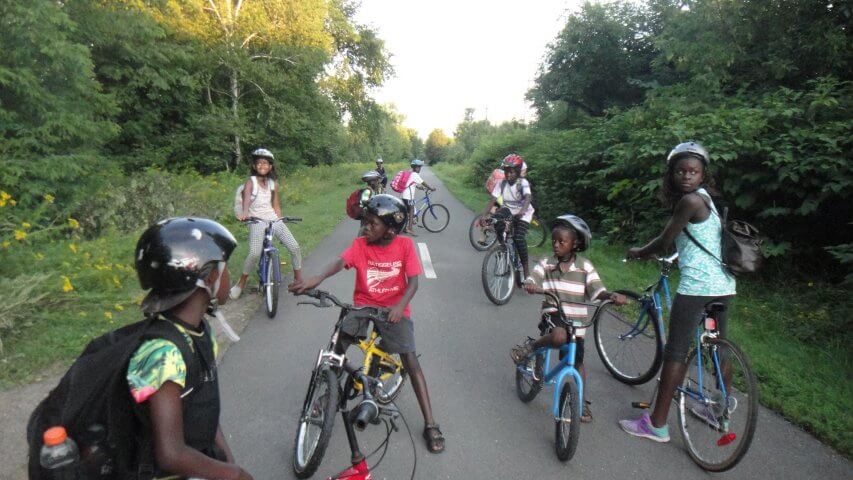
It is 7 pm on a warm Friday night in August 2016. A group of children and youth are gathered before a row house on the north-side Fredericton streets of Doone Street and Wilson Row. Most are sitting on bicycles, helmets on, poised to depart, laughing and talking. A few others wait for one of the bikes collected into racks in front of a row house. A man with reddish hair is checking the bicycles for safety and suitability for the rider. The approximately 15 cyclists are speaking a range of languages including French, English, Kikongo and Swahili. When everyone is ready, the group proceeds to the nearby bike trail, heading toward Barker’s Point Wading Pool.
The youth are members of the Wil-Doo Community Bike Club, a volunteer operated program for lower income youth aged 7 to 15 years who reside on the two streets forming the club name. The Wil-Doo Community Bike Club is well known to its membership of newcomers, refugees, long-time New Brunswick residents and residents of St. Mary’s First Nation. In the summer months, club members cycle to places like film screenings and wading spots.
A recent adventure included cycling to a concert by Gypsophilia, a 7-piece instrumental band that combines hot jazz with klezmer, funk, and world rhythms. The group performed at the Fredericton Playhouse on Sept. 22 for a Conservation Council of New Brunswick fundraiser. Members of the audience were captivated by the Wil-Doo Community Bike Club members’ enthusiastic response including dance moves, cheers and heart signs to the band. “The gang really enjoyed the show!” wrote founder and chief organizer, Jenn Wambolt, on the group’s Facebook page.
According to Wambolt, the group performs important functions in the Doone Street neighborhood. The club provides respite for parents during the summer months. In addition to learning physical literacy, the bike club builds a sense of belonging and esteem. Importantly, the youth learn to rely on and respect each other. During the rides, they must operate as team members. When conflicts arise, the group uses a restorative justice approach to find solutions that keep the group together.
The Wil-Doo Community Bike Club has been operating since the summer of 2014. In that year, the community centre lost its funding from the Fredericton Community Foundation to run a day camp for the children and youth in the neighbourhood. A long time community volunteer, Wambolt realized the youth were left without needed programming. Wambolt started the bike club with donated bikes similar to the ones she and her husband, Rusty Wambolt, currently refurbish.
When asked about her inspiration, Wambolt does not hesitate. Because a parent was a teacher, Wambolt knows the importance of skill building and training. In addition, she also cites the musical, The Sound of Music. She recalls scenes of Maria, played by Julie Andrews, with the seven von Trapp youth joyously pedaling and singing through the Austrian mountains. Wambolt watched the show with friends whose parents were diplomats. These screenings took place outside of Canada during the nearly five years she spent in Malawi and Nigeria. Wambolt’s international experience provides a context for how she bonds with the children and youth. Many of the cyclists have roots in other countries including the Democratic Republic of the Congo, Nepal, the Philippines and Malaysia.
After around twenty minutes of cycling, the group arrives at our destination. Some of the youth head to the wading pool. Wambolt and I sit at a picnic table to discuss the club. Some members describe what the bicycle club means to them on note cards. They state “Bike club Rules”; “bike club is fun.” For one youth, the bike club represents “power.” One youth describes it as “amazing.” For another, it is a chance to “meet the new places.” Many of the cyclists say they are glad to learn more about their city. Wambolt is finishing the interview when one youth says he is getting “freezy,” he wants to head home. The older children laugh gently, knowing he is cold. The bicycle troupe heads out of the park. A young girl slips on loose rocks and falls. Wambolt consoles her, sees to her scrapes as the other riders wait for everyone to rejoin the group. “Flip flops” Wambolt ruefully explains to me. She insists on helmets and footwear, reluctantly allowing open-toed sandals.
Once on the trails, we greet a teenager leaning on her bicycle. She is, Wambolt explains, a former club member. While living with autism, she functioned with the group before adopting other activities. With Wil-Doo, she gained confidence and physical strength. “She is still riding her bike,” Wambolt states with satisfaction, a smile crossing her face. The bicycle club members pedal towards home, as Wambolt and I follow. The cyclists seem to be enjoying the summer evening. Importantly, they are also building strength and fostering community through cycling.
Josephine L. Savarese is a member of the board of directors of the NB Media Co-op.
Conserver House, the office of the Conservation Council, is acting as a drop-off location for donations of bikes and bike parts to the Wil-Doo Community Bike Club.

